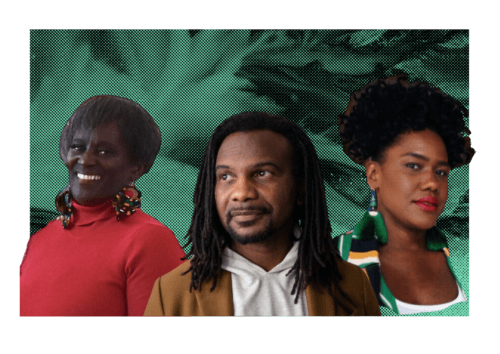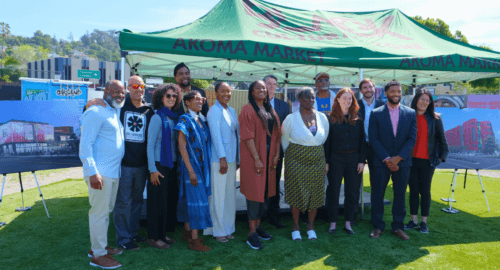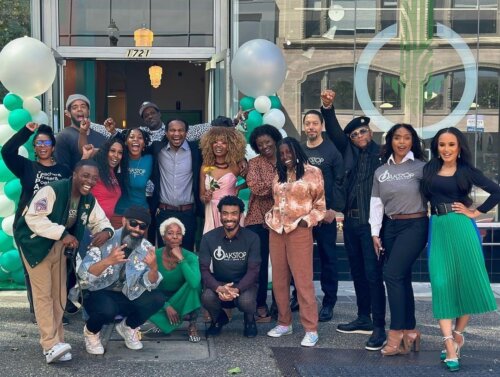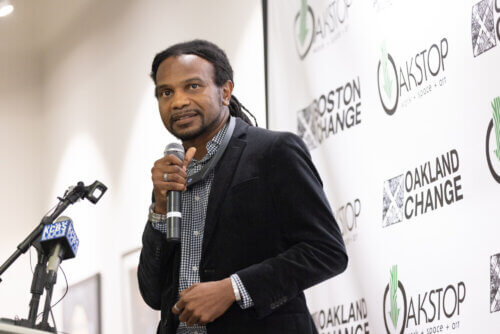Black Cultural Zone pt. 2: Reparations as Requisite for Reimagining

Photo by Amir Aziz
Developed in partnership between CAST & PJS Consultants
Interviews & content drafted by artist/writer dana e. fitchett with editing by CAST
This is part 1 of a 6-part blog series where we’ve spent time hearing from our partners in Oakland: Black Cultural Zone, Oakstop, and Betti Ono Foundation. Read why we’re highlighting these three Black Oakland natives and their remarkable work here.
Reconciling Truths
In our last story release, we shared some background information about Black Cultural Zone and CEO Carolyn “CJ” Johnson. This week, we’re sharing some more in-depth story about our work in partnership with CJ and BCZ.
CJ insists that, in order to create the change that BCZ is working toward, repair must happen first, and that illuminating the truth is a prerequisite for repair.
“You gotta start with telling the truth to each other,” she urges. “We’ve got to reconcile the different truths between everyone. Everyone wants to rush to reimagining, but first we need to talk about what’s been done.”
She points to the arts as one place where this truth-telling can happen in a way that impacts the hearts and minds of people. “Artists should be resourced to be the ones to show and tell the truth in an emotional way that moves people to give a damn,” she says. “People need to get out from distancing themselves from the problem by saying, ‘I didn’t own slaves,’ and instead get to a place where they can acknowledge what happened and the ways they benefit from it, regardless of their level of active participation.” This is a process that CAST—as an organization aspiring to be community-centered—is beginning to undertake.
The fact of the matter, as CJ plainly states, is that, “This country couldn’t be this country without what was done to us and what we’ve done for this country.” Instead of continuing to reinforce the anti-Blackness and other forms of systemic oppression that keep Black and Indigenous cultural workers struggling for resources and stability, we must support, elevate, and fortify these cultivators of culture. Though getting more financial capital is one vital step in our current context, the work can’t stop at simply redirecting more funding in the direction of Black and Indigenous artists and cultural workers. Instead, systemic transformation is necessary.

“How do we use arts and culture to elevate indigenous practices and cultivate a cooperative society?,” CJ asks. “I would love to see Oakland as a truly cooperative city. Ownership, rents, and mortgages are all carryovers from plantation days. What does it mean to center and celebrate culture in order to actually change the culture? We have to really honor artists, medicine people, etc. Prioritizing the written word and math has really flattened what used to be very rich cultures.”
Working with CAST

CAST’s history with BCZ starts at Eastside Arts Alliance in 2018, when Eastside was awarded a Keeping Space-Oakland (KSO) planning grant for their work in mitigating displacement, disenfranchisement, and disinvestment of Black East Oakland community members. Eastside’s goal was to secure and activate a collaborative hub that celebrates Black cultural traditions and innovations, a vision that coincided with the development of a Black Cultural Zone. Birthed from the Oakland Sustainable Neighborhoods Initiative started in the early 2010s, the East Oakland Black Cultural Zone Collaborative, composed of nonprofit and community organizations, grew organically from reflecting upon historical power movements and on the ground knowledge gleaned from decades of collective community service. It established the groundwork for what would later inform the development of the BCZ CDC, and the KSO planning grant was one of the many milestones along its journey.

CJ’s relationship with CAST dates back to when she worked at Community Vision (then known as Northern California Community Loan Fund or NCCLF), where she first worked with CAST’S CEO Emeritus, Moy Eng. At the time, Moy was in her previous role at The William and Flora Hewlett Foundation, managing a grant in support of arts groups buying their spaces in San Francisco during the dot com boom to mitigate the negative impact nonprofit organizations were experiencing relative to holding onto spaces. She then had several years of overlapping work engagements with Moy and with CAST Senior Advisor, Josh Simon, who she met while underwriting loans at East Bay Asian Local Development Corporation (EBALDC). When CJ left NCCLF to go back to real estate, she recruited Josh to join the work. Eventually, CJ, Moy, and Josh all found their way into exploratory conversations that ultimately led to the formation and launch of CAST.
“CAST was created because we knew that organizations like BCZ CDC didn’t have access to friendly capital,” CJ explains. “Oakland’s not a city that funds pre-development. We need funds like what we get from CAST to even get a project developed and gain access to a split that’s reasonable and doesn’t rake us over the coals.”
When CJ found herself ready to get the BCZ CDC going, she knew who to talk to. Given her, Moy and Josh’s history of working together and their shared vision, it was a logical step to take. “We share an understanding that to sustain arts and community, we have to anchor in real estate,” CJ says. They agreed to work together on BCZ CDC’s first project: Liberation Park. While the project entails a Market Hall, Cultural Hub, and Residences as well, CAST is partnering with BCZ on the Market Hall and Cultural Hub elements of the work.

With Oakland City Council unanimously approving the future transfer of site control to BCZ in March 2024, BCZ is in planning phases for a three-story building that will house indoor and outdoor cafe and dining options on the 10,000-square-foot first floor, and coworking and office space for small businesses on the second and third floors, with 119 units of affordable housing in the adjacent six-story Residences building. The Market Hall will also feature a co-working space and other amenities that support community well-being without having to travel outside of East Oakland. In some ways, it will be a similar but expanded version of Akoma Market, continuing the commitment to showcasing and supporting Black and Indigenous businesses.

Given that the project is grounded in securing a sizable piece of real estate, combined with the mission-driven nature of all of BCZ’s work, partnering with CAST makes sense on multiple levels.
“We really need people in the seats who’ve done deals and aren’t just speaking theoretically,” CJ shares. “And it’s also important that CAST is BIPOC-led, especially since real estate is very White man-driven. I’m very careful about partnering with organizations,” she acknowledges. “They have to be more than BIPOC in name; they have to also understand the value inherent in Black communities.”
About her willingness to partner with us despite not being a Black-led organization, CJ says, “I had existing personal and professional relationships with Moy and Josh. It’s important that people know your core. We don’t always agree, but I trust them and they trust me, and that’s important.” CJ explains that working in this way with people requires a particular kind of relationship, that you can’t do this type of long, uncertain, and complex work with just anyone. The collaborating team’s previous history, their depth of experience in real estate development, and their shared commitment to communities of color creates a sturdy foundation for weathering the inevitable storms that come along the course of the work. “Between Moy, Josh, me, and others,” CJ says, “we‘ve probably done 100 deals. Having that depth of experience helps us find creative solutions where other folks might hit a wall. We’ve learned together the limits of creativity, as we still run up against ideations versus what will realistically work. Pragmatism is painful, but we live and learn what we can do more of from every deal.”
One of the Challenges of Partnering with CAST

Though partnership and collaboration are necessary and powerful in the pursuit of social transformation, working closely across all kinds of difference is far from simple. One challenge that CJ elevates in regards to our partnership is the limitations in terms of how risk is defined and managed. Given her emphasis on tapping into imagination, dreaming bigger, and creating sustainable, systemic transformation, it makes perfect sense that the concept of risk would need to be reconsidered and redefined.
“I’m interested in rethinking how we manage risk,” she shares. “At the end of the day, we all have boards to answer to, money to pay out, etc. But how can we build in more possibility for risk taking while continuing to meet the mark on financials?”
Our Learning
With our feet historically planted in the industry of commercial real estate development, our expansion into the Oakland Black Arts Ecosystem is humbling us as we learn alongside our partners. CAST has tended to be more calculated in our risk-taking and conventional in our approach to risk. CJ’s generous partnership and reflection has underscored the importance of making efforts toward pushing beyond our limits, since working within them has not yet transformed the systemic challenges in the way we know is necessary.
Beyond that, CJ embodies and models a willingness and commitment to taking risks in service of change.

Seeing the power of her example has made our real estate team more thoughtful and measured in considering alternative possibilities that we might have easily ruled out in the past; and helped us to become more assertive when speaking to funders about the nature and depth of the challenges we seek to effect—and the type and amount of funding needed to do so. This has resulted in more understanding and flexibility among funders.
We’re committed to paying forward our learning by informing and challenging those in positions of power. CAST will be an advocate for others to interrogate the existing rules they’ve established and consider the value and urgency of redefining them.
Read the series
This six-part blog series was developed in partnership between CAST and PJS Consultants, with interviews and content drafted by artist/writer dana e. fitchett, and editing by CAST.
- Community of Practice
Recognize the Present to Repair the Future
An introduction to three Oakland partnership stories.

- Community of Practice
Black Cultural Zone pt. 1: A Demonstration of the Power of Hope
The story of Black Cultural Zone and Liberation Park.

- Community of Practice
Oakstop pt. 1: Stabilizing Space and Place
The story of Oakstop and how they’re shifting the narrative for community work.

- Community of Practice
Oakstop pt. 2: Building Legacy and Creative Ecosystems
CAST and Oakstop reimagining community spaces through creative ownership.

- Community of Practice
Betti Ono pt. 1: Building Cultural Permanence Through Art, Community, and Bold Leadership
Learn about how Betti Ono is redefining cultural belonging and empowering artists in Oakland.

- Community of Practice
Betti Ono pt. 2: Amplifying Black Voices in Oakland’s Cultural Ecosystem
Betti Ono Foundation’s partnership with CAST and the ongoing fight for equitable access to resources for Black cultural workers in Oakland.


About dana e. fitchett
dana e. fitchett is a trans-disciplinary artist whose practices are grounded in listening and cultivating new languages in service of alignment, integrity, and freedom. Within and outside of PJS Consultants, dana writes and edits for individuals and community organizations working for transformation and justice by way of truth and reconciliation. As Founder and Creative Director of dance collective, Movement for Liberation; teacher of her original Groovement classes; and in her visual art and transcription processes, dana works in and in conversation with the expressive legacy of the African diaspora. Also a novice music producer and practiced plant-based foodmaker, she holds a certificate in nonprofit management and leadership; a bachelor’s degree in urban studies; and a master’s of fine art in interdisciplinary art, and spends most of her time between Boston, Brooklyn, and Oakland.




